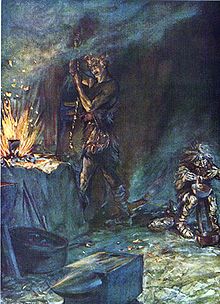- Potion
-
A potion (from Greek poton "that which one drinks") is a consumable medicine or poison.
In mythology and literature, a potion is usually made by a magician, sorcerer, dragon, fairy or witch and has magical properties. It might be used to heal, bewitch or poison people. For example, love potions make a person fall in love (or become deeply infatuated) with another (the love potion figures tragically into most versions of the tale of Tristan and Iseult, including Richard Wagner's opera Tristan und Isolde); sleeping potions cause a person to fall asleep (in folklore, this can range from normal sleep to a deathlike trance); and elixirs heal/cure any wound/malady (as in C.S. Lewis' The Lion, the Witch, and the Wardrobe). Goscinny and Uderzo's character Asterix the Gaul gained superhuman strength from a magic potion brewed by the druid Getafix.
Creation of potions of different kinds was a common practice of alchemy, and was commonly associated with witchcraft, as in The Tragedy of Macbeth by William Shakespeare.
During the 19th Century, it was common in certain countries to see wandering charlatans offering curative potions. These eventually gained reputations as quack medicines. In later years, these transformed into patent medicines.
 Illustration by Arthur Rackham to Richard Wagner's Siegfried: While Siegfried reforges the sword Nothung, Mime prepares a sleeping potion to use on him.
Illustration by Arthur Rackham to Richard Wagner's Siegfried: While Siegfried reforges the sword Nothung, Mime prepares a sleeping potion to use on him.
In modern fantasy, potions are often portrayed as spells in liquid form, capable of causing a variety of effects, including healing, amnesia, infatuation, transformation, invisibility, and invulnerability.[1] Potions have also gained popularity as a standard item in role-playing video games, usually as a healing item. The availability of healing potions in the popular Final Fantasy series of games eventually resulted in the release of an actual beverage named "Potion" in Japan by Square Enix, the games' creators.
Potions are also mentioned frequently in the Harry Potter series. In this case, potions have many different effects such as the truth serum, Veritaserum, various poisons, love potions, and sleeping draughts. Potions such as the Aging Potion allow the drinker to age depending on how much is drunk. (As seen by Fred and George Weasley in Harry Potter and the Goblet of Fire.) More common potions from the series would be Polyjuice Potion, the Draught of the Living Death, and Felix Felicis.
See also
References
- ^ John Grant and John Clute, The Encyclopedia of Fantasy, "Potions", p 779 ISBN 0-312-19869-8
External links
Witchcraft and magic Types African witchcraft (Witch smeller · Vodun) · Asian witchcraft (Kulam) · European witchcraft (Akelarre · Benandanti · Brujería · Cunning folk · Seid · Völva · White witch · Witch Cult) · Asian witchcraft · North American witchcraft (Appalachian Granny Magic · Hoodoo · Huna · Pow-wow · Santería · Vodou · Voodoo) · South American witchcraft · Australasian witchcraft (Makutu) · Contemporary witchcraft (Feri Tradition · Hedge witchcraft · Stregheria · Wicca)Practices Animism · Coven · Divination · Familiar animal · Familiar spirit · Flying ointment · Herbcraft · Magic · Necromancy · Occultism · Poppet · Potions · Satanism · Spiritism · Spiritualism · Sigils · Shamanism · Witch ball · Witch's ladderFolklore and mythology Agamede · Aradia · Baba Yaga · Circe · Drude · Elbow witch · Hecate · Huld · Kalku · Medea · Obayifo · Witch of Endor · Sorginak · Spearfinger · Weird sisters · Sea witchMajor historic treatises Documentary film Categories:- Alchemy
- Fantasy tropes
Wikimedia Foundation. 2010.

